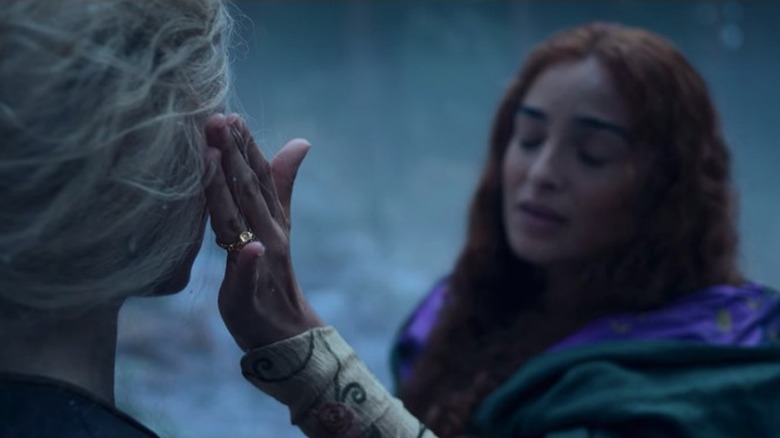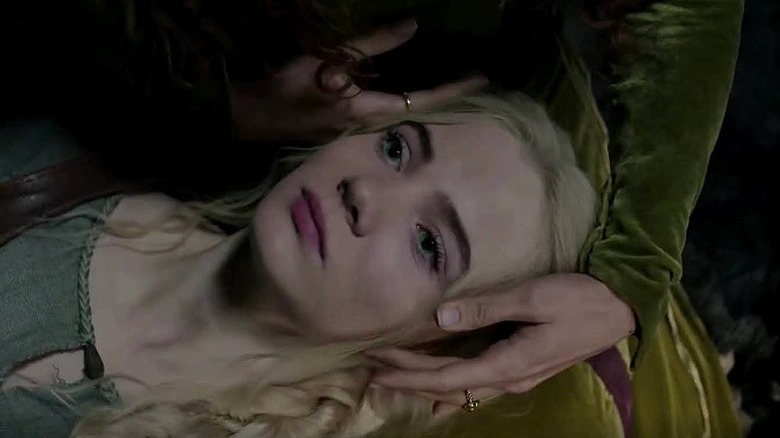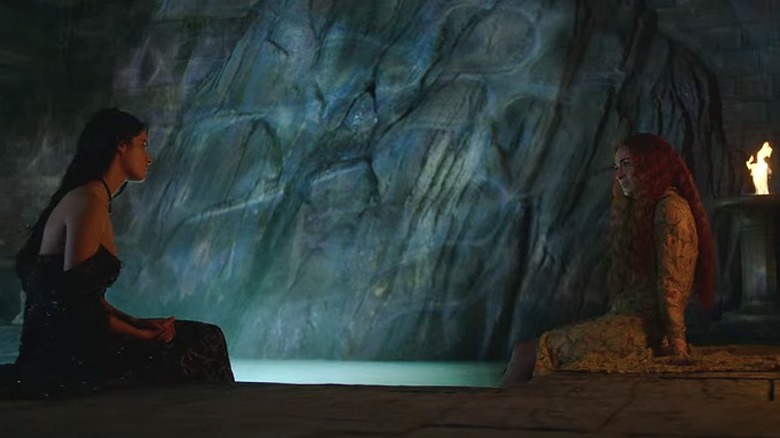Triss Merigold's Powers From The Witcher Season 2 Explained
"The Witcher" creator Lauren S. Hissrich had her work cut out for her when it came to recreating Triss Merigold (portrayed by Anna Shaffer) for television audiences. Though the Netflix adaptation is based on the books — wherein Triss shows up only occasionally, plays a key role or two, and often comes off as well-meaning but weak-willed — the character gained a whole new fanbase with the release of CD Projekt RED's games. The company didn't introduce the character of Yennefer in its first game and subsequently used Triss as a kind of stand-in for the powerful mage and romantic interest. The ongoing (and vigorous) debate about whether or not Triss seduced or abused Geralt during their short-lived affair notwithstanding — an affair that, to be clear, is alluded to only briefly in the books, and explained in one line in "Blood of Elves" (via Reddit) — the series' hybridization of book Triss and game Triss does play-out with regard to her abilities in Season 2.
In fleshing out Triss' character, the team behind Netflix's adaptation dug deeper into what sort of skills a mage known for her healing abilities might have. Triss' propensity to throw fireballs, for instance, falls by the wayside and is replaced by an encyclopedic knowledge of chemistry, botany, and genetics. She even knows how to trace genetic alchemy (an outlawed practice that looms large in author Beau DeMayo's "The Witcher: Nightmare of the Wolf") by mixing various substances and letting them sit overnight. Triss is certainly a force to be reckoned with in the games, but her powers are of an understandably more physical (and visually spectacular) nature. In contrast, it's her vast knowledge of Chaos and of The Continent (its history as well as its mechanics) in Season 2 that speaks to her real power.
Triss Merigold is a skilled healer
When Triss stumbles upon Ciri (Freya Allan) in the woods outside Kaer Morhen in Season 2, Episode 4, "Redanian Intelligence," the princess is bloodied and bruised from her Witcher training. With little more than a few words in Elder Speech and a light touch of her hand, Triss is able to heal a deep gash on the young girl's face instantaneously. She can also (like all sorceresses) hear Ciri's heartbeat, and notes that it's beating faster. It's implied in the same episode that both Lambert (Paul Bullion) and Vesemir (Kim Bodnia) are more than familiar with Triss, and have taken advantage of her healing powers in the past.
When Lambert jokes that the women are doubling on him and calls the sorceress by her last name only, she tells him, "I see your wounds have improved but your manners have not," implying the Witchers call on her often for her medical abilities. What's more, as viewers will recall from Season 1, Triss saves Geralt's life by healing him after he sustains a gruesome wound during his successful attempt to free King Foltest's daughter from the bloodthirsty Strega.
Triss has the ability to connect psychically
Though the impulsive and determined Ciri is hell-bent on using the elixir made by her Elder Blood to become to first new Witcher in centuries (in order to, as she puts it, "find a new truth" in the wake of the one she lost), Triss offers her a safer alternative.
In addition to her healing powers, Triss has the ability to psychically connect with others (provided they trust her) and engage in a process known as "Dol Durza," or, "The Valley of the Soul." By entering into Ciri's mind while she's in a trance-like state, Triss is able to unlock "the deepest layer of (Ciri's) consciousness and uncover things that may be hidden there," such as genetic memories, as she says in Episode 5, "Turn Your Back." Ciri agrees, hesitantly, since the truth of the source of her Elder Blood (aka, her genetic memories) might also reveal the truth behind her Destiny. During the trance, however, Triss immediately realizes something is wrong since the individuals in the scenes and memories are able to interact with the mage and her young charge when they shouldn't even be able to see them.
In Andrzej Sapkowski's "Blood of Elves," the violent finale of Ciri's trance nearly kills Triss, and although the skilled sorceress is powerful enough to wriggle free (instead) in the series, it's clear she understands that she's no match for whatever's behind Ciri's uncontrollable Chaos.
Despite her powers, Triss Merigold has an ironic affliction
Though not explicitly stated in the series, there's a clue to the limits of Triss' power that we learn more about in the books. Savvy viewers might be wondering why, if Triss is such a powerful healer, she's unable to heal the burns she sustained at The Battle of Sodden. In the series, Yennefer (Anya Chalotra) seems to understand Triss can't remedy them herself and says they'll talk to Tissaia (MyAnna Buring) about getting them taken care of. Triss declines Yennefer's offer, and although on the surface it appears she simply wants to keep them as a grim reminder not to take her survival for granted, there is something else at play here.
Despite being able to heal people with magic elixirs, Triss herself is allergic to the magic contained in them. In Sapkowski's "Blood of Elves," Geralt attempts to treat a gravely ill Triss, but when he asks her which of the elixirs he should give her, she says there are none: "'I'm allergic!' she sobbed with helpless exasperation and despairing anger. 'I always have been! I can't tolerate elixirs! I can treat others with them but can only treat myself with amulets'" (p. 143, 144).
Though Season 2 doesn't linger on the mage's inconvenient intolerance, her inability to mend her scars is both an important foreshadowing of events to come, and a clear nod to the otherwise powerful healer's powerlessness when it comes to her own body.



